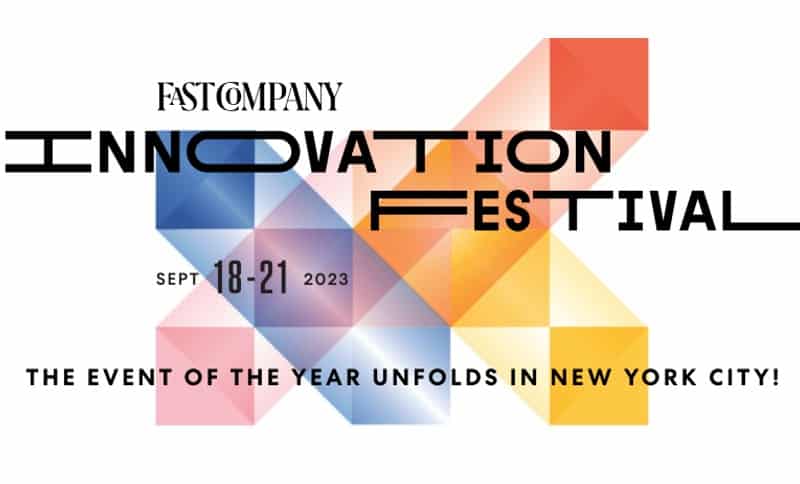Live from New York, the 2023 Fast Company Innovation Festival has convened innovators, entrepreneurs, and creative thinkers from all over the world at Manhattan’s Financial District for their 9th annual event. Celebrity headliners include Halle Berry, Gabrielle Union, Tracee Ellis Ross, and Christy Turlington Burns.
The Festival kicked off on Monday with the opening of their “Fast Tracks”, a field trip of open doors across Manhattan, welcoming attendees into the offices of some of the world’s biggest brands. Panels and headline speakers commenced on Tuesday.
See Also: Fast Company Innovation Festival: Ray Dalio, Lidiane Jones, Slutty Vegan, and Clare V.
Mediaweek continued its in-person coverage on Wednesday, attending key sessions throughout the day. Here is a recap of the highlights:
Unscripted Success: Harnessing improv for innovation with Hartbeat’s CEO
CEO Thai Randolph has been at the helm of HARTBEATS’ recent expansion, growing a production company into a multi-platform entertainment and storytelling ecosystem.
This iteration was conceived and executed during the COVID-19 pandemic. The company continues to prosper in the face of a competitive streaming environment, and the macroeconomic implications of the current Writers Guild and SAG-AFTRA strikes in the United States.
Randolph expressed, “The whole reason we founded the company was around this very simple mission of keeping the world laughing together. And so we thought, what were the ways that we could bring that proposition to life?”
In the session, led by interviewer Pavithra Mohan, staff writer at Fast Company, Randolph illustrated how the team at HARTBEAT “Yes, and-ed” themselves to success, taking inspiration from the art of improv. This makes sense when you consider the chairperson and namesake of HARTBEAT is comedian Kevin Hart.
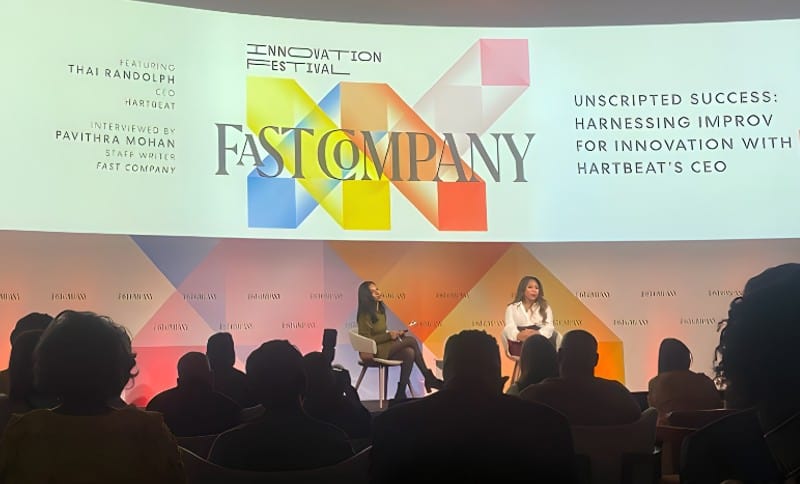
“I am not a comedian. I work very closely with one,” she continued, describing how adopting the core tenets of improv has worked for HARTBEAT.
“Improv is based on a few key principles. One is flexibility, really active listening, and this idea of free play in the moment. But overall, the number one rule, and it’s one that we now live by as an organisation rooted in humour, but also an organisation committed to constant innovation and disrupting ourselves, is this idea of ‘Yes, and…’
“In an improv scene, ‘Yes’, is accepting whatever the proposition is with your partner, and whatever the realities are of the scene that you’re in.
“We’ve taken that framework of ‘Yes, and…’ at every critical juncture in our existence, to not bury our heads in the sand, but to embrace what’s happening around us and embrace the realities of our partners and our consumers.”
The team is now even incorporating improv classes into their onboarding to encourage an environment of flexible thinking.
Design in the age of AI
AI was undoubtedly the buzzword of the day, with numerous sessions centring on the trending subject. However, the innovative voices that joined moderator Mark Wilson, global design editor at Fast Company, to talk about the intersection of AI and UX design, were able to breathe life into what could otherwise be an exhausted topic.
On stage were Catherine Courage, vice president of knowledge UX at Google, Nona Farahnik Yadegar, design director at Snap Inc., and Jason Yuan, former human interface designer at Apple, now co-founder and chief design officer of New Computer, an alpha-stage start-up that’s on a mission to forge computers that can intuitively adapt to their human owners.
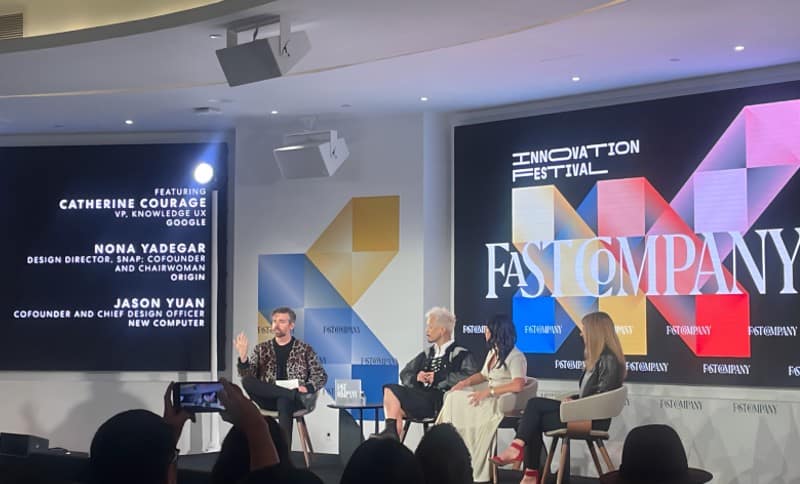
L to R: Mark Wilson, Jason Yuan, Nona Farahnik Yadegar, Catherine Courage
Courage spoke of Bard as a natural growth of Google’s fundamentals; that being Search-generative experiences. She explained how the recently released extensions and plugins that pull from other Google properties like Gmail are being embraced by users who see the usefulness of AI to help organise their lives.
She explained, “In our world of Search, it’s about helping people organise the world’s information and making it accessible and useful, and being able to do that at scale, being able to do that globally.
“So really, rather than increasing the digital divide [it’s] reducing it, because it’s very accessible and easy to do for everyone… I think that’s really exciting.”
Yadegar describes the core use case of Snapchat as a way of talking to your real friends. At Snap, AI innovations such as My AI were brought in to support that use case.
Yadegar observed, “For us [at Snap], we have a kind of history of starting with novel technologies in a more obvious place and expanding beyond there. So for example, with AR, I think in 2015, puking rainbows out of your mouth was kind of the way that people understood AR on Snapchat.
“Today it’s developed into an entire suite of products, both inside of our app, but also for businesses and for developers and our Lens Studio.”
See also: Over 10 billion messages have been sent to new SnapChat AI bot, My AI
As for New Computer, AI supports the vision that Yuan and his team are actualising, which, in his words, “is what I would affectionately call the world’s most personal personal computer.”
He further detailed, “What we imagine this to be is a relationship that you have with an entity that reflects yourself. It’s not like a Waifu or whatever. You’re not talking literally to yourself.
“You are, through your interactions with the world … manifesting your intent and wisdom into this being that can partner with you through life.”
Patterns of Success: How Tracee Ellis Ross is revolutionizing the haircare industry
Daughter of legendary Motown singer Diana Ross, Tracee Ellis Ross carved out a household name for herself in her own right through an illustrious acting career.
Over the last ten years, however, Ross has gone on even further to prove her business acumen, as she fought to bring her Pattern haircare brand to life.
In order for Pattern to exist, Ross would have to fight against false notions that curly, coily, or tight textured hair is a niche market, physical limitations such as existing shelf space, lack of data to inform supply chains, and the vernacular of an industry rife with problematic and demeaning designations for these hair types, mostly targeted at Black women.
Ross stated, “What evolved out of that was what is now the mission of the brand, which is to exceed the needs of the curly, coily and tight texture community.
“We are centred around the celebration of Black Beauty. Anyone can buy our products, but our content is centred around the celebration of Black Beauty.
“For me, the point was I wanted to shift the paradigm around how we were marketed to in general as human beings, but particularly for Black people, the premise of marketing is often ‘you have a problem, and you need this product in order to fix your problem.’ I disagree. I shop the most when I feel good about myself.”
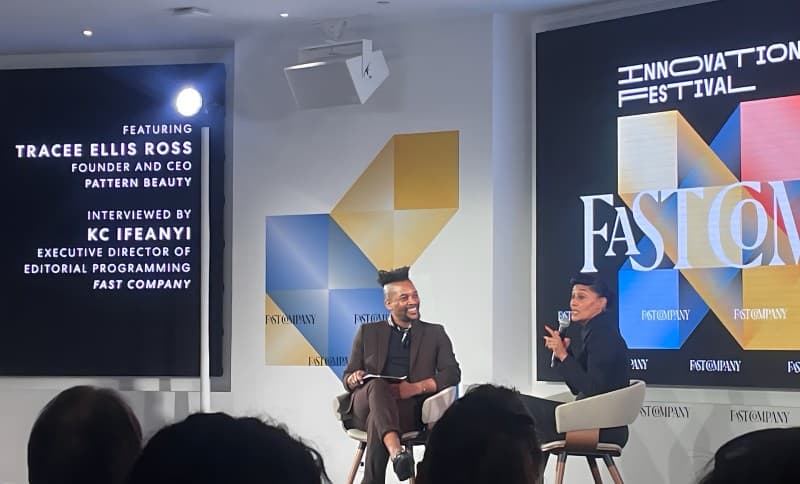
To combat the lack of data surrounding this market, Ross also revealed that she encouraged McKinsey to conduct their Black Representation in the Beauty Industry study in 2022.
Session interviewer, Kc Ifeanyi, executive director of editorial programming at Fast Company, brought up the racial disparities the study found in the beauty industry, citing, “they found that Black consumers in the US spent US$6.6 billion on beauty, which equates to just over 11% of the total beauty market. But Black brands make up 2.5% of revenue in that category.”
Ross added, “Also, one of the largest groups of growing founders are Black women, and we get the least amount of money.
“I had that experience as a consumer, and then as a business owner and a business builder. I was seeing it in many different areas… That’s why I want that data out there. That’s why I talk about the spending power of this community.”
The next step in Pattern’s evolution will be its expansion of distribution into professional salons, which they announced last month. Ross understood someone’s hairdresser is often their first trusted contact point of advisory, and that the move “will be another access point into everybody being able to have [Pattern] products.”
Innovating Imagination: How Airbnb is using AI to foster creativity
If there was ever a candidate to continue the previous conversation of design and AI, it would be the closing headliner of the day, Brian Chesky, co-founder and CEO of Airbnb.
Chesky was a particularly interesting voice to speak on the matter, not only as a CEO of a Fortune 500 company, but given his background is not business or finance. It is in fact, design.
Chesky graduated from the Rhode Island School of Design in 2007, and spent the early days of his career working as an industrial designer for 3DID.
Moderator James Vincent, founder and CEO of “narrative therapy” company FNDR, commented on how that has played out in the UX of Airbnb, “When you go on Airbnb, you feel like you’re a good human. It purposefully designs that human interaction.”
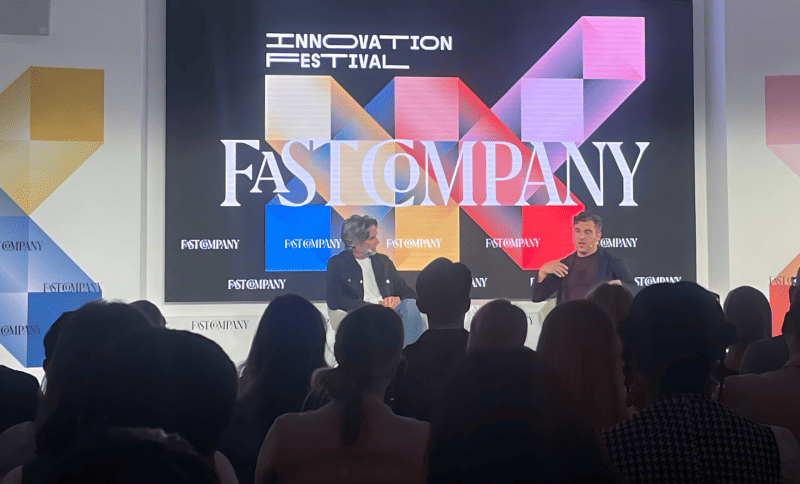
In characterising AI, Chesky referenced Steve Jobs’ understanding of the computer as “a tool.”
Chesky recounted, “He even described the computer as a bicycle for the mind. What he meant by that was that humans are fairly efficient locomotive creatures. But if you give them a bicycle, they’re more physically efficient than any other creature on Earth, including the Condor. And so the computer was like giving somebody a bicycle that made them significantly more efficient.
“And if that’s what a computer was, then AI is just a maximum acceleration that is probably the most powerful tool ever invented by humans. And it’s only the beginning, I think we’re in this almost Prometheus moment.”
Chesky also likened the nature of tech to the existential nature of power, asking “is power [inherently] bad?” The great challenge of our lifetime, Chesky said, will be “designing technology that’s good for us.”
Chesky believes, like many others, that in order to do so, AI needs to be developed with design principles constructed not by any one siloed expertise but with “disciplinary diversity.”
He said in a summary, “There’s an old saying not everything that counts can be counted, not everything that can be counted, counts.
“It’s very important that we do not live in a world where everything is just purely financial, purely operationalised and that technologists are the only ones making technology decisions.
“It could be a marriage of creative technologists, humanities. That’s what made Apple so special.”
See Also: Fast Company Innovation Festival: Nike, NBA, Netflix, Dwayne Wade, Halle Berry, e.l.f.
